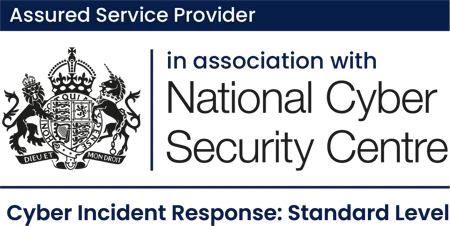Swift action, assured recovery: Incident Response excellence
Experiencing a cyberattack, ransomware, DDoS, fraud, or business email compromise? Get immediate Incident Response support now.
The Integrity360 approach: proactive, proficient, prepared
React to cyber incidents with confidence, ensuring minimised disruption and damage. We combine cutting-edge technology with seasoned expertise to confront cyber threats, ensuring your organisation is always ready. We're your trusted partner in the heat of a cyber crisis.
Why choose Integrity360 for ransomware response?
When a ransomware attack strikes, a swift and structured response is vital. At Integrity360, our incident response experts deliver a recovery process designed to minimise disruption and restore your operations with speed and precision. Here's what you can expect:

Around-the-clock response
Our Security Operations Centre (SOC) operates 24/7, ensuring immediate availability when an incident occurs. Once engaged, our incident response specialists will act without delay – deploying remotely or on-site the same day to begin containment and recovery.
Fast-track system recovery
We work alongside your internal teams to decrypt and recover critical data, aiming to get your systems back online quickly. Our focus is on reducing downtime and limiting the operational and reputational impact of the attack.
Comprehensive digital forensics
Integrity360’s specialists are trained to conduct thorough forensic investigations, identifying how the incident occurred, what was affected, and how to prevent reoccurrence. We can also support legal or regulatory proceedings with expert witness services and evidence handling as needed.
NCSC Assured Service Provider
Integrity360 is endorsed under the Cyber Incident Response (CIR) Scheme Assurance and has undergone assessments aligned with NCSC standards, ensuring our capability to deliver top-tier cyber incident response services.
With Integrity360, you gain a trusted cybersecurity partner that will assess, contain and eliminate threats – ensuring a confident path to recovery.
Our Services
Digital Forensics
Emergency Incident Response
Compromise Assessment
Most Active Ransomware Gangs 2025
Akira
The Akira ransomware group was first identified in March 2023. It primarily targets corporate networks across North America, with attacks reported in sectors such as education, finance, insurance, real estate, manufacturing, recreation, and business consulting. Akira uses double extortion tactics, stealing sensitive data before encrypting systems to pressure victims into paying a ransom.
ALPHV/Blackcat
ALPHV—also known as BlackCat, AlphaV, or AlphaVM—is a ransomware-as-a-service (RaaS) operation active since November 2021. It is recognised as the first ransomware group to use the Rust programming language, enabling faster, more adaptable malware. ALPHV is infamous for its triple extortion tactics: encrypting files, exfiltrating sensitive data, and launching DDoS attacks to pressure victims.
Ransomhub
RansomHub is a ransomware-as-a-service (RaaS) group first detected in February 2024, comprising members from across the globe. Known for its structured operations, RansomHub imposes strict rules on its affiliates during attacks—violations can lead to bans from the group. Victim organisations are publicly named on RansomHub’s darknet leak site. The group pledges not to attack targets in CIS countries, Cuba, North Korea, China, and Romania.
Qilin
Qilin also known as Agenda, is a ransomware-as-a-service (RaaS) group that has targeted organisations across a wide range of sectors worldwide. This cyber threat actor is operated by a user known as “Qilin” on underground cybercriminal forums. The group provides customised ransomware variants to affiliates in return for a share of any ransom payments collected. Qilin’s malware is tailored to specific targets, making its attacks more effective and harder to detect. Active on the global stage, the group has become known for its adaptability and growing list of victims.
Clop
Clop is a sophisticated ransomware group first identified in February 2019, known for targeting large enterprises across multiple sectors worldwide. The group carries out data-extortion and ransomware attacks, often exploiting zero-day vulnerabilities to gain access to corporate networks. Clop has been linked to several high-impact campaigns, most notably the MOVEit Transfer attacks, which resulted in the theft of sensitive data and millions in ransom payments. Its technical expertise and aggressive tactics make Clop a significant threat to organisations globally.
Play
The Play ransomware group—also known as PlayCrypt—first emerged in June 2022, deploying its own custom ransomware in targeted attacks. Play uses a double extortion model, stealing sensitive data before encrypting files. If victims refuse to pay the ransom, the stolen data is published on the group’s data-leak site to increase pressure. This tactic has made Play a growing concern for organisations worldwide. While initial attacks focused on select industries, Play has since expanded its reach, targeting a broader range of sectors.
SafePay
is a newly emerged ransomware group first observed in late 2024. It uses a double extortion model, deploying a modified LockBit payload to steal and encrypt sensitive data from critical systems. Once compromised, victims face ransom demands under threat of data exposure. SafePay’s operations involve gaining initial access, conducting post-compromise activity, and moving laterally within networks—often by exploiting vulnerable remote desktop services.
Scattered Spider
Scattered Spider is a financially motivated cybercriminal group that has been active since at least May 2022. Known for its sophisticated extortion and ransomware campaigns, the group has primarily targeted organisations in telecommunications, the arts, entertainment, recreation sectors and most recently the retail sector. Scattered Spider is also notable for its focus on compromising software-as-a-service (SaaS) platforms and cloud service provider (CSP) environments to steal sensitive data. The group employs advanced techniques to gain access, move laterally, and exfiltrate valuable information for extortion.
Lynx Ransomware
Lynx Ransomware is a ransomware-as-a-service (RaaS) group first observed in July 2024. Financially motivated, the group uses both single and double extortion tactics—encrypting data and threatening to leak it unless a ransom is paid. On 24 July 2024, Lynx issued a public statement claiming it avoids targeting government institutions, hospitals, and non-profit organisations. Once a system is compromised, the group drops a "readme.txt" file containing a unique ID and a link to its Tor-based portal. Like many RaaS operators, Lynx maintains a data leak site (DLS) to list victims and pressure them into paying.
Medusa
Medusa is a ransomware-as-a-service (RaaS) platform first identified in 2021, operated by a financially motivated cybercriminal group. The threat actors behind Medusa primarily exploit unpatched vulnerabilities to gain access to corporate networks. Once inside, they deploy ransomware to encrypt data and demand payment for its release. Medusa has launched attacks across a wide range of industries, including technology, education, manufacturing, healthcare, and retail making it a broad and persistent threat.
Dragonforce
First detected in November 2023, DragonForce is a rapidly emerging ransomware group whose origins remain unverified. Despite being a relatively new player, DragonForce has quickly risen to prominence and is now ranked among the top 20 global ransomware groups in operation. The group is known for launching highly disruptive attacks using double extortion techniques—stealing data before encrypting systems to pressure victims into paying ransoms. DragonForce targets organisations across various sectors, and its activity shows a high level of coordination and technical capability.
Killsec
KillSec began as a hacktivist collective but has since evolved into a ransomware-as-a-service (RaaS) provider, actively supplying customisable ransomware tools to affiliates for cyber extortion. Now operating as a financially motivated threat actor, KillSec has demonstrated its growing capabilities by targeting organisations across a wide range of industries worldwide.
Speak to an IR expert
Be prepared for any incident. Strengthen your defences with our expert Incident Response Services.
Ensure rapid recovery and robust protection against cyber threats with our dedicated support.
Speak to one of our Incident Response team to find out more about our emergency and retainer services.
London: +44 20 3397 3414
Sofia: +359 2 491 0110
Cape Town: +27 08 606 25673
Johannesburg: +27 08 606 25673
Incident Response FAQs
What is Incident Response (IR)?
Incident Response is the process of identifying, containing, investigating, and recovering from cybersecurity incidents such as malware infections, ransomware attacks, unauthorised access, and data breaches.
What does Integrity360’s Incident Response service include?
Integrity360 provides 24/7 incident response with expert-led containment, forensics, threat analysis, remediation guidance, and recovery support. The service includes remote and on-site support, detailed post-incident reports, and assistance with legal or regulatory obligations.
When should we engage an incident response team?
You should engage an IR team as soon as you suspect a breach or security incident—such as unusual login activity, ransomware, unauthorised system changes, or data exposure. Early containment reduces impact and speeds up recovery.
Do we need to be an existing Integrity360 customer to get help?
No. Integrity360 offers both retained IR services and ad hoc emergency response for organisations in need of immediate support—even if you’re not currently a client.
What is an IR retainer, and do we need one?
An IR retainer is a pre-arranged agreement ensuring rapid access to IR specialists in the event of an incident. It helps reduce response time, improve preparedness, and may include proactive services like tabletop exercises and threat hunting.
How fast can Integrity360 respond to an incident?
With a retained service in place, response can begin in as little as one hour. For ad hoc incidents, the team prioritises urgent triage and initial containment actions as quickly as possible.
Does the service include digital forensics and root cause analysis?
Yes. Integrity360’s IR service includes full forensic analysis to determine the source, impact, and scope of the incident—along with recommendations to prevent recurrence.
What makes Integrity360’s IR service different?
Integrity360 combines deep threat knowledge, rapid mobilisation, regulatory expertise, and tailored support. The service is backed by a dedicated IR team with real-world breach response experience and access to a 24/7 SOC.




